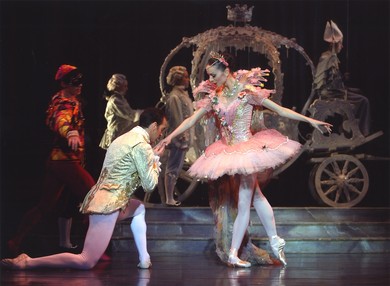Main Stage
| 4 March |
| 19:00 |
| 2011 | Friday |
|
Cinderella (ballet in three acts) Ballet in 3 acts
|
|
| Artists |
Credits |
Nikolai Volkov, Libretto author Yevgeny Monakhov, Set Designer
|
World premiere: Mariinsky Theatre, St.Petersburg, Russia Premiere of this production: 05 Mar 2002 The performance has 2 intermissions Running time: 2 hours 50 minutes
Prokofiev’s Cinderella choreographed by Alexei Ratmansky, good and sincere story of Cinderella, Prince, Love and basic values of Life, was premierred at the Mariinsky Theatre in March 2002.
At the time, Ratmansky was a little-known figure: a Bolshoi-trained dancer who had worked for several western companies and was launching his career as a choreographer. A decade later he is the world's most influential ballet-maker, credited with revitalising classical dance through a series of highly individual productions.
His Cinderella is an uneven work which shows evidence of the choreographer's struggle to reconcile highly diverse elements.
The Copenhagen Post: "Ratmansky’s production is attractive for its light and playful atmosphere, its irony and its self irony. The choreography successfully combines good traditions with inventiveness. A healthy sense of humour guarantees a “democratic feel” and intelligibility to the performance, the thirst for the acting finds a joyous response from the performers, and the exaggerated attention to stylistics gives the ballet a western gloss." Libretto: Nikolai Volkov after motifs from the fairytale: Charles Perrault Music For Ballet: Premiere of Alexei Ratmansky´s version: 5 March 2002, Mariinsky Theatre, St Petersburg
Ratmansky’s production is attractive for its light and playful atmosphere, its irony and its self irony. The choreography successfully combines good traditions with inventiveness. A healthy sense of humour guarantees a “democratic feel” and intelligibility to the performance, the thirst for the acting finds a joyous response from the performers, and the exaggerated attention to stylistics gives the ballet a western gloss. The Copenhagen Post
The choreographer has filled Charles Perrault’s tale with links and various phenomena of the 20th century. We have seen much that is familiar from European ballet, from cinema, from the stage, from TV – but all together, the montage itself, bears a new meaning and a new vision of the changing world.
Peterburgsky Teatralny Zhurnal SynopsisAct I
A room in Cinderella’s Father’s house. Her Stepmother, a capricious and arrogant woman, and her two daughters Kubishka and Khudishka, are occupied with preparations for the ball. The hairdressers are styling their hair. The kind and polite Cinderella, wearing an old dress, is the image of her dead mother.
She is busy with the dirtiest household tasks. Once alone, Cinderella mourns the past, remembering her happy childhood days. Her Father appears and Cinderella throws her arms around him. He, however, has come in drunk with his drinking companions to ask his daughter for money. The Stepmother appears and launches a tirade of abuse at her husband. Cinderella is alone once more. Suddenly, an old tramp appears. Cinderella pities her. The final preparations for the ball are being made. The dance teachers arrive.
They rehearse with Khudishka and Kubishka, but the slow-witted Sisters are unable to learn the steps. Cinderella observes the lesson.
The Stepmother and the Sisters depart for the palace. Cinderella waltzes dreamily, thinking up her own dance for the ball. The old tramp appears again; she is, in fact, a Fairy and has come to reward Cinderella’s kindness.
She presents her with a pair of glass slippers and a dress that she removes from her heavy bags. The Four Seasons appear and help with Cinderella’s transformation.
The Fairy warns Cinderella that the effect of the magic charms will cease at midnight.
If Cinderella does not leave the palace on time, she will instantly find herself dressed in dirty rags again.
Act II
The ball at the palace is in full swing. The Stepmother and her daughters arrive. Kubishka, Khudishka, the Stepmother and all the ladies try to attract the attention of the Prince. Unexpectedly, an unknown figure appears. The Stepmother and the Sisters do not recognise Cinderella.
The Prince is enchanted by her. Her every movement delights the court.
The hall empties; the Prince and Cinderella are left alone. Cinderella, carried away by the fact that her dreams have come true, suddenly remembers about the time. The clock begins to chime midnight. Cinderella runs from the palace and, in her haste, loses one of the slippers. The Prince and the guests rush after her, but she disappears. The Prince picks up the tiny slipper – it will help him find the mysterious beauty.
Act III
The court ladies of the kingdom are in despair; the slipper is too small for their feet. The Prince leaves to search the world for the unknown girl. Early in the morning Cinderella is dozing in her corner of the house. After waking up, she remembers the previous night. If it were not for the slipper she unexpectedly finds, the whole thing could have been a dream. The Sisters appear. Naturally, they once again begin to quarrel.
Cinderella tries to part them, but the Stepmother enters and falls on her.
Unexpectedly, the searchers rush in, looking for the girl who lost her slipper at the ball. The Prince arrives. None of the girls there remotely remind him of his mysterious beauty. In vain Kubishka and Khudishka try to squeeze their foot into the tiny slipper. Then the Stepmother decides to try it on. Cinderella, hidden in her corner, drops the other slipper.
The startled Prince looks at Cinderella and recognises the girl he has been looking for. The Fairy-Tramp puts the slippers back in her bag. They have served their purpose here, but they will come in handy somewhere else…
|
|
 Mariinsky Theatre:
Mariinsky Theatre:  Mariinsky-2 (New Theatre):
Mariinsky-2 (New Theatre):  Mariinsky Concert Hall:
Mariinsky Concert Hall: 

